Understanding the Role of Micronutrients in TPN Solutions
Understanding the Fundamental Components of TPN
Total Parenteral Nutrition (TPN) is a complex therapy designed to deliver all essential nutrients directly into a patient's bloodstream, particularly when the gastrointestinal tract cannot be utilized. Central to this formulation are the micronutrients—vitamins, minerals, trace elements, and electrolytes—which are indispensable for maintaining physiological functions, supporting immune response, and promoting healing. This article explores the vital role of micronutrients within TPN solutions, their composition, clinical significance, and considerations for safe and effective administration.
Essential Micronutrients Included in TPN
What are the essential micronutrients included in Total Parenteral Nutrition (TPN)?
Total Parenteral Nutrition (TPN) contains a carefully balanced mixture of essential micronutrients. These include vital vitamins, minerals, and trace elements that support various physiological functions.
Vitamins are critical for metabolism, cellular function, and immune response. TPN solutions typically incorporate both water-soluble vitamins (such as vitamins B-complex and C) and fat-soluble vitamins (A, D, E, and K). These help with energy production, antioxidant defense, blood clotting, and bone health.
Minerals or electrolytes like calcium, potassium, phosphorus, and magnesium are included to maintain electrolyte balance, support bone strength, facilitate nerve signaling, and promote muscle function.
Trace elements such as zinc, copper, selenium, chromium, and manganese are added in precise amounts. They act as cofactors in enzyme systems, bolster immune function, aid in tissue repair, and support antioxidant defenses.
To meet individual patient requirements and avoid deficiencies, the amounts of these micronutrients are tailored based on ongoing monitoring of electrolyte and nutrient levels. Proper formulation of TPN solutions ensures effective and safe support for patients unable to obtain nutrients via the gastrointestinal tract.
These micronutrients, combined with macronutrients like glucose, amino acids, and lipids, make TPN a comprehensive nutritional therapy, crucial for recovery, healing, and maintaining vital functions in complex medical conditions.
Search Query : Essential micronutrients in TPN solutions
The Role of Micronutrients in TPN Therapy
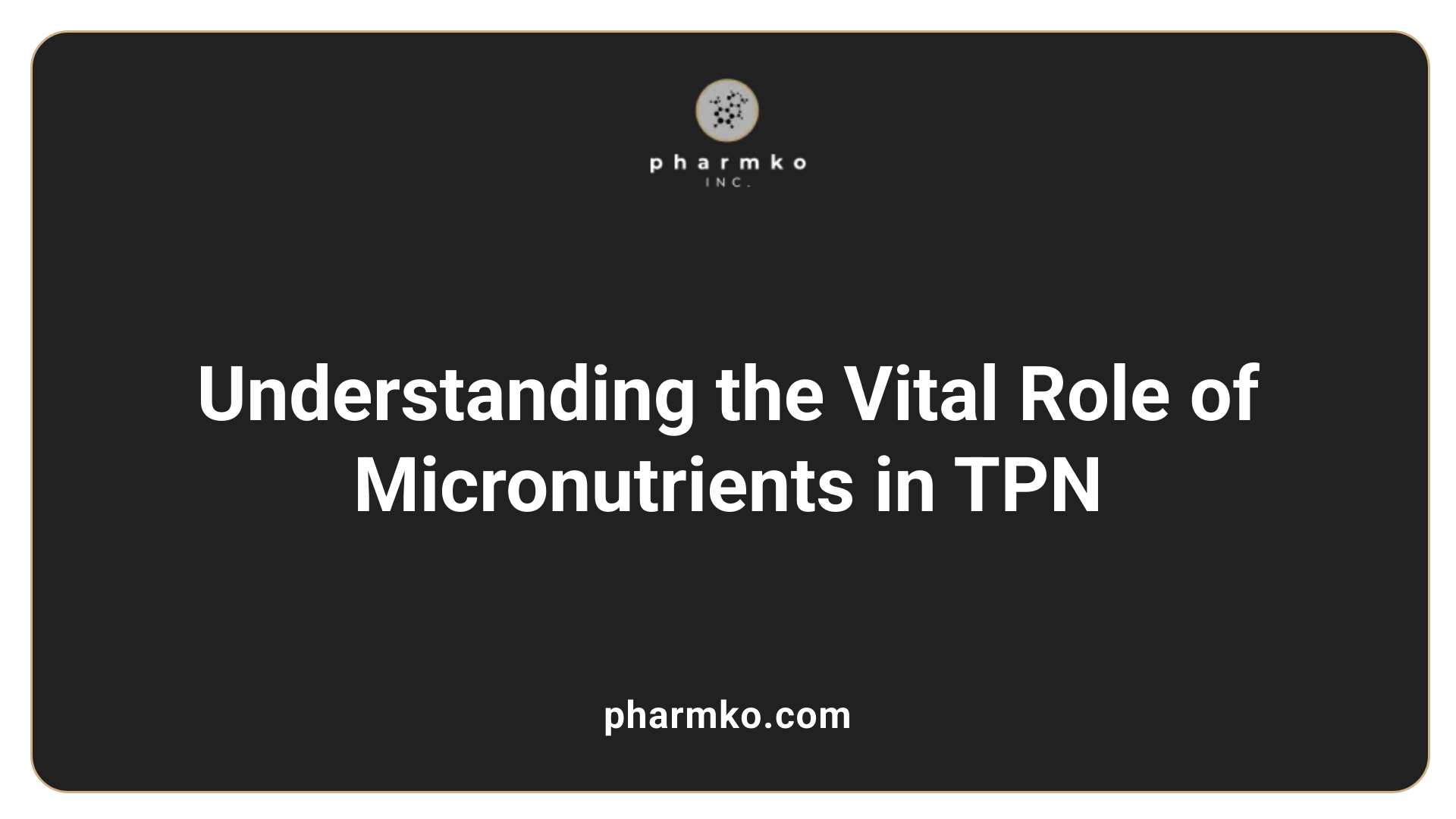
What is the role of micronutrients in TPN therapy?
Micronutrients, which include vitamins and trace elements, are vital for the proper functioning of the human body, especially when delivered via Total Parenteral Nutrition (TPN). These small but essential components support several key bodily processes, such as metabolism, immune system activity, and tissue repair.
In TPN solutions, micronutrients are carefully selected and dosed to match individual patient needs. They include water-soluble vitamins like B-complex and C, as well as fat-soluble vitamins such as A, D, E, and K. Trace elements like zinc, copper, selenium, chromium, and manganese are also incorporated. These nutrients help in maintaining normal physiological functions, supporting immune defense, and promoting healing.
Support of metabolic processes
Micronutrients play a crucial role in supporting metabolism. Vitamins like B-complex facilitate enzymatic reactions that produce energy from nutrients. Minerals like magnesium and phosphorus are essential for enzymatic activities and cellular energy production. Adequate levels of these nutrients help prevent metabolic disturbances such as deficiencies, which could lead to complications like weakness or organ dysfunction.
Immune system function
Vitamins such as C and E bolster antioxidant defenses, reducing oxidative stress and supporting immune responses. Zinc and selenium are integral for immune cell activity and antimicrobial functions. Ensuring sufficient micronutrient intake through TPN enhances the patient's ability to fight infections and recover more efficiently.
Bone health and tissue repair
Minerals including calcium, phosphorus, and magnesium are fundamental in maintaining bone density and supporting tissue regeneration. Trace elements like zinc and copper also contribute to wound healing and tissue repair processes, which are especially important for postoperative and critically ill patients.
Antioxidant defense and immune response
Vitamins C and E serve as antioxidants, neutralizing free radicals that can damage cellular components. Selenium acts as a cofactor for antioxidant enzymes, further protecting tissues. These nutrients help modulate immune responses, reduce inflammation, and prevent oxidative injury.
Proper monitoring and adjustment of micronutrient levels are critical in TPN therapy to avoid deficiencies or toxicities. Regular blood tests, including serum electrolytes, vitamins, and mineral levels, ensure optimal nutrition and patient safety.
| Nutrient Type | Specific Nutrients | Function | Monitoring and Notes |
|---|---|---|---|
| Vitamins | A, B-complex, C, D, E, K | Cellular metabolism, antioxidant defense, blood clotting | Regular blood levels, individual needs assessment |
| Minerals & Trace Elements | Calcium, phosphorus, magnesium, zinc, copper, selenium, chromium | Bone health, enzyme activation, immune function | Serum levels, toxicity signs, clinical symptoms |
By providing personalized and carefully balanced micronutrients, TPN supports recovery and promotes overall health, reducing risks associated with nutritional deficiencies during long-term parenteral feeding.
Common Components of Micronutrients in TPN Solutions
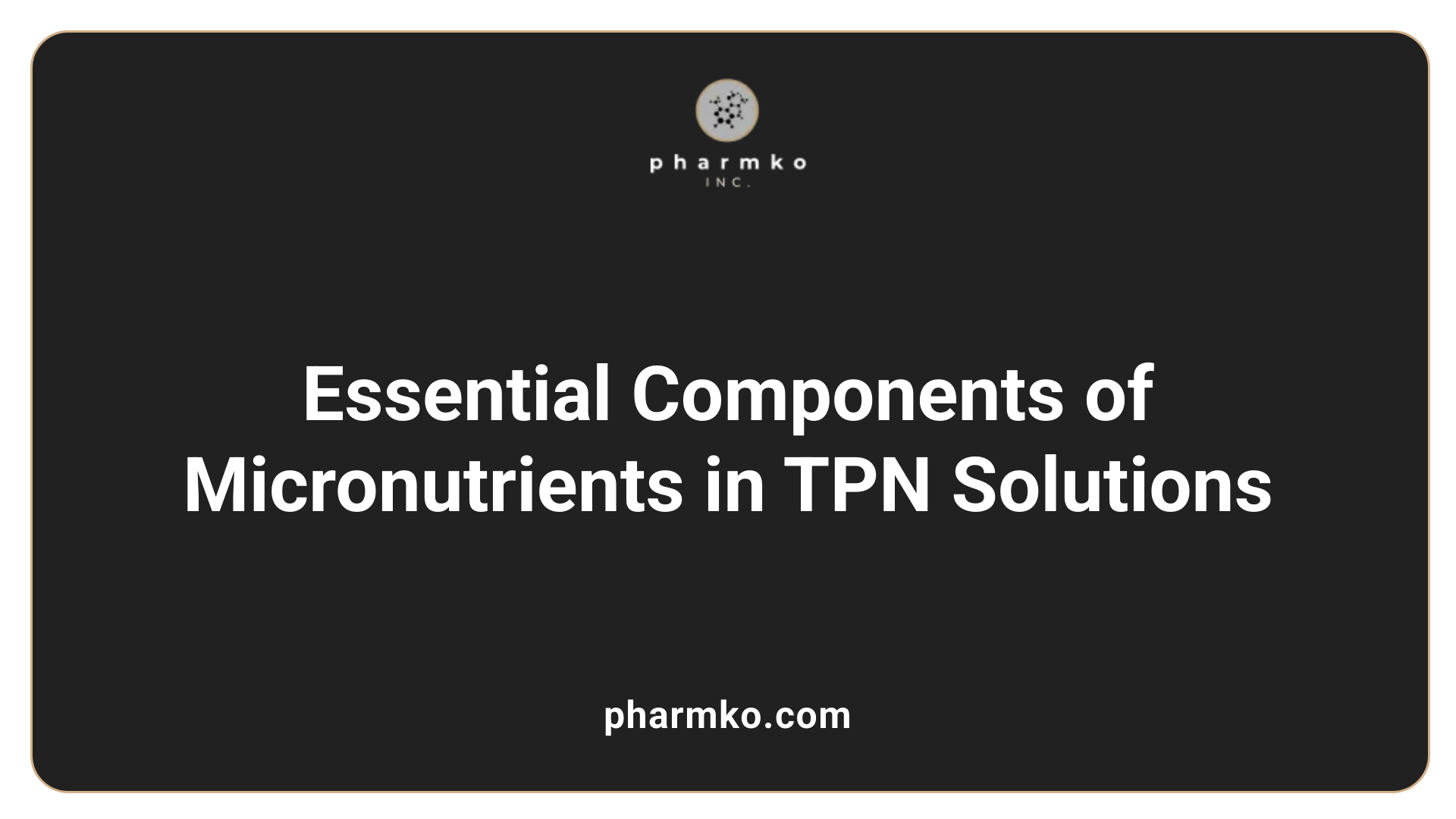
What are the common components of micronutrients in TPN?
Total Parenteral Nutrition (TPN) contains an essential combination of micronutrients that support vital bodily functions and assist in recovery. These include electrolytes, trace elements, and vitamins, all carefully selected to meet individual patient needs.
Electrolytes are crucial minerals involved in fluid balance, nerve signal transmission, and muscle function. The most common electrolytes included in TPN are sodium, chloride, potassium, calcium, magnesium, and phosphorus. These are administered in carefully controlled amounts, such as sodium at 100-150 mEq per liter and potassium at 50-100 mEq per liter, ensuring proper physiological balance.
Trace elements serve as cofactors for numerous enzymatic reactions essential for health. TPN solutions typically contain zinc, copper, manganese, chromium, and selenium. These trace minerals support immune function, promote wound healing, and help in detoxification processes.
Vitamins included in TPN encompass both water-soluble and fat-soluble types. Water-soluble vitamins involve B-complex vitamins and vitamin C, important for energy production, cellular metabolism, and antioxidant defense. Fat-soluble vitamins include vitamins A, D, E, and K, which are vital for vision, bone health, immune support, and blood clotting.
The integration of these micronutrients within TPN formulations ensures that patients receive comprehensive nutritional support. Healthcare professionals adjust the dosages based on lab results and clinical conditions to prevent deficiencies and avoid toxicity.
| Micronutrient Category | Examples | Role in the Body |
|---|---|---|
| Electrolytes | Sodium, chloride, potassium, calcium, magnesium, phosphorus | Fluid balance, nerve and muscle function |
| Trace Elements | Zinc, copper, manganese, chromium, selenium | Enzymatic reactions, immune support, healing |
| Vitamins | Vitamins A, D, E, K, B-complex, C | Metabolic functions, antioxidant defense, clotting |
This carefully balanced mix of micronutrients in TPN is essential not only to prevent deficiencies but also to enhance healing, support immune health, and optimize overall recovery in patients who cannot feed orally or enterally. Regular monitoring and adjustment are vital to the effectiveness and safety of TPN therapy.
Importance of Micronutrient Composition Individualization
Why are micronutrients important in TPN solutions?
Micronutrients in Total Parenteral Nutrition (TPN) are essential components that include vital vitamins and trace minerals necessary for a wide range of physiological functions. These micro-nutrients support processes such as cellular metabolism, immune defense, blood clotting, and tissue repair.
Including an adequate balance of micronutrients in TPN helps prevent deficiencies that may cause immune suppression, delayed healing, or other metabolic issues. For patients on long-term parenteral nutrition, proper micronutrient provision is critical for maintaining overall health and preventing complications.
Patient-specific formulation
The composition of micronutrients in TPN must be tailored to each patient’s unique needs. Factors like age, existing health conditions, nutritional status, and ongoing clinical requirements influence the dosages and types of vitamins and trace elements administered.
Healthcare professionals, including dietitians and clinicians, collaborate to ensure each TPN solution meets the individual’s precise nutritional demands. This personalized approach helps optimize healing, support growth, and reduce the risk of toxicity or deficiencies.
Monitoring serum levels
Regular monitoring of serum electrolytes, vitamins, and mineral levels is essential for maintaining safe and effective TPN therapy. Blood tests conducted weekly or more frequently allow clinicians to detect imbalances early.
Monitoring helps confirm that the patient’s micro-nutritional needs are adequately met and adjustments can be made to the TPN formulation as needed. This ongoing assessment ensures the prevention of complications such as hypervitaminosis or mineral toxicity.
Adjustments based on clinical needs
Adjusting micronutrient content in TPN is based on laboratory results, clinical response, and specific conditions like electrolyte disturbances or metabolic anomalies.
Patients with renal impairment, hepatic dysfunction, or electrolyte imbalances may require tailored doses of minerals like potassium, magnesium, or zinc. In certain cases, additional supplementation with specific vitamins or trace elements like selenium or chromium may be necessary.
This individualized modification of micronutrient composition ensures that patients receive optimal support for recovery while minimizing the risks of adverse effects.
Including an individualized approach in the formulation of micronutrients in TPN reflects current guidelines such as those from ESPEN 2022, which emphasize patient-centered nutrition strategies for safe and effective parenteral support.
| Aspect | Consideration | Purpose |
|---|---|---|
| Formulation | Tailored doses of vitamins, minerals, and trace elements | To meet individual nutritional needs |
| Monitoring | Regular blood tests of electrolytes, vitamins, and minerals | To detect imbalances early |
| Adjustment | Modify composition based on lab results and clinical status | To optimize patient recovery |
Through meticulous customization, healthcare providers ensure that each TPN solution effectively supports the patient’s health, promotes healing, and minimizes risks associated with micronutrient imbalances.
Potential Complications of Micronutrient Supplementation
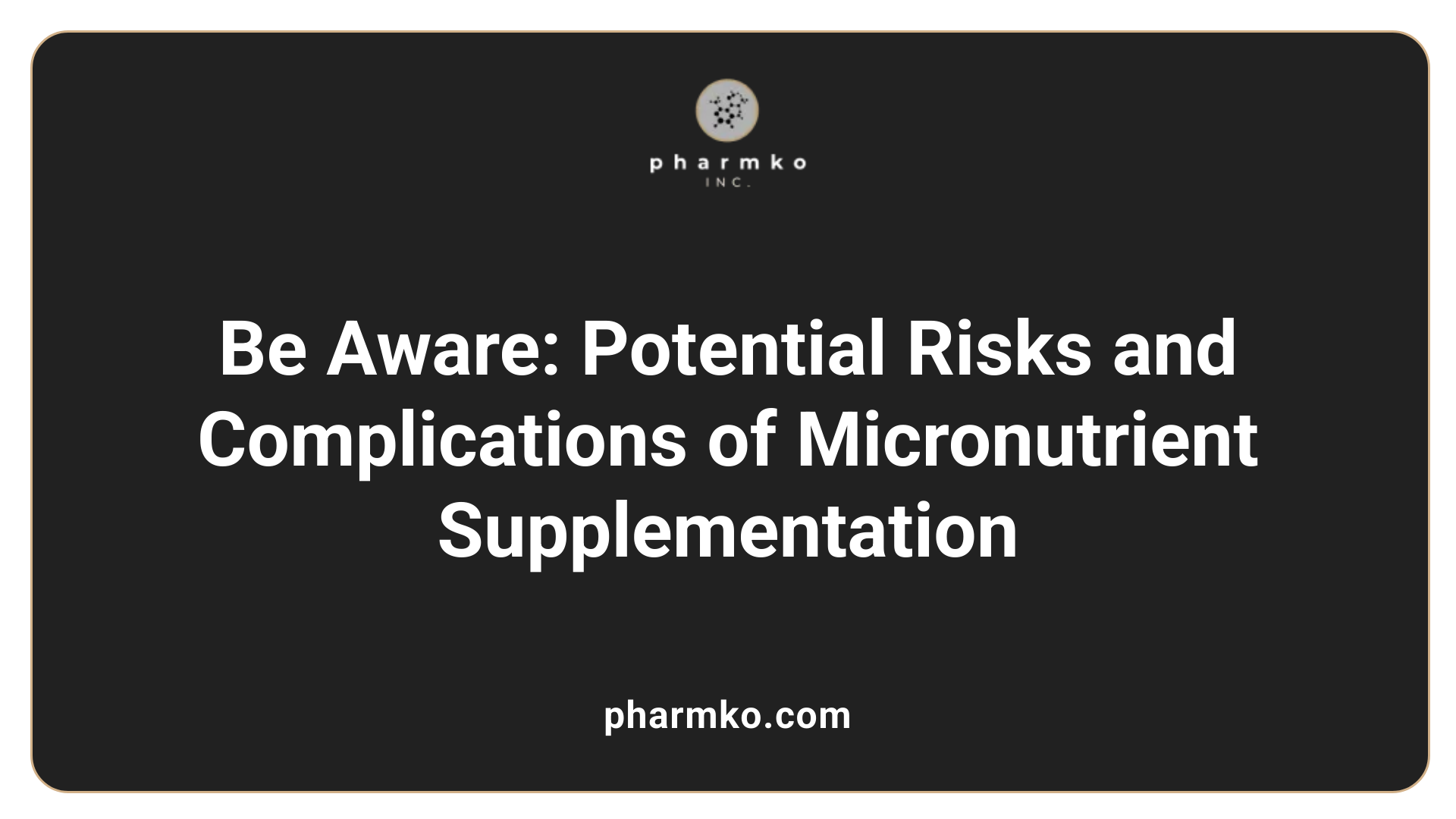
What are the potential complications related to micronutrient supplementation in TPN?
Administering micronutrients through Total Parenteral Nutrition (TPN) is vital for patient recovery, but it also carries certain risks if not properly managed. Electrolyte imbalances are among the most common concerns. For example, improper dosing of electrolytes like phosphate, potassium, or magnesium can lead to hypophosphatemia, hypokalemia, and hypomagnesemia, respectively. These disturbances can cause muscle weakness, cardiac arrhythmias, and neurological issues if left untreated.
Over-supplementation of vitamins and minerals can also result in toxicity. Excess manganese, for instance, may deposit in the brain, causing neurological symptoms similar to Parkinson's disease, known as extrapyramidal signs. Conversely, deficiencies in micronutrients such as zinc, copper, or selenium can contribute to poor wound healing, immune suppression, and metabolic disturbances.
Metabolic complications associated with micronutrient imbalance include hyperglycemia, which can occur with excessive glucose infusion, and cholestasis, a liver condition characterized by impaired bile flow. Fatty liver and liver enzyme elevations are also linked to long-term TPN use, especially when micronutrient levels are not carefully monitored.
Effective management involves regular laboratory monitoring of serum electrolytes, liver function tests, and vitamin levels. This allows healthcare providers to adjust micronutrient doses promptly, minimizing the risks. Ensuring strict aseptic techniques during catheter care and infusion is crucial to reduce the risk of bloodstream infections, which pose serious threats in long-term TPN patients.
Overall, maintaining a balanced approach to micronutrient supplementation is essential to optimize patient outcomes and prevent complications.
Monitoring and Ensuring Safety in Micronutrient Administration
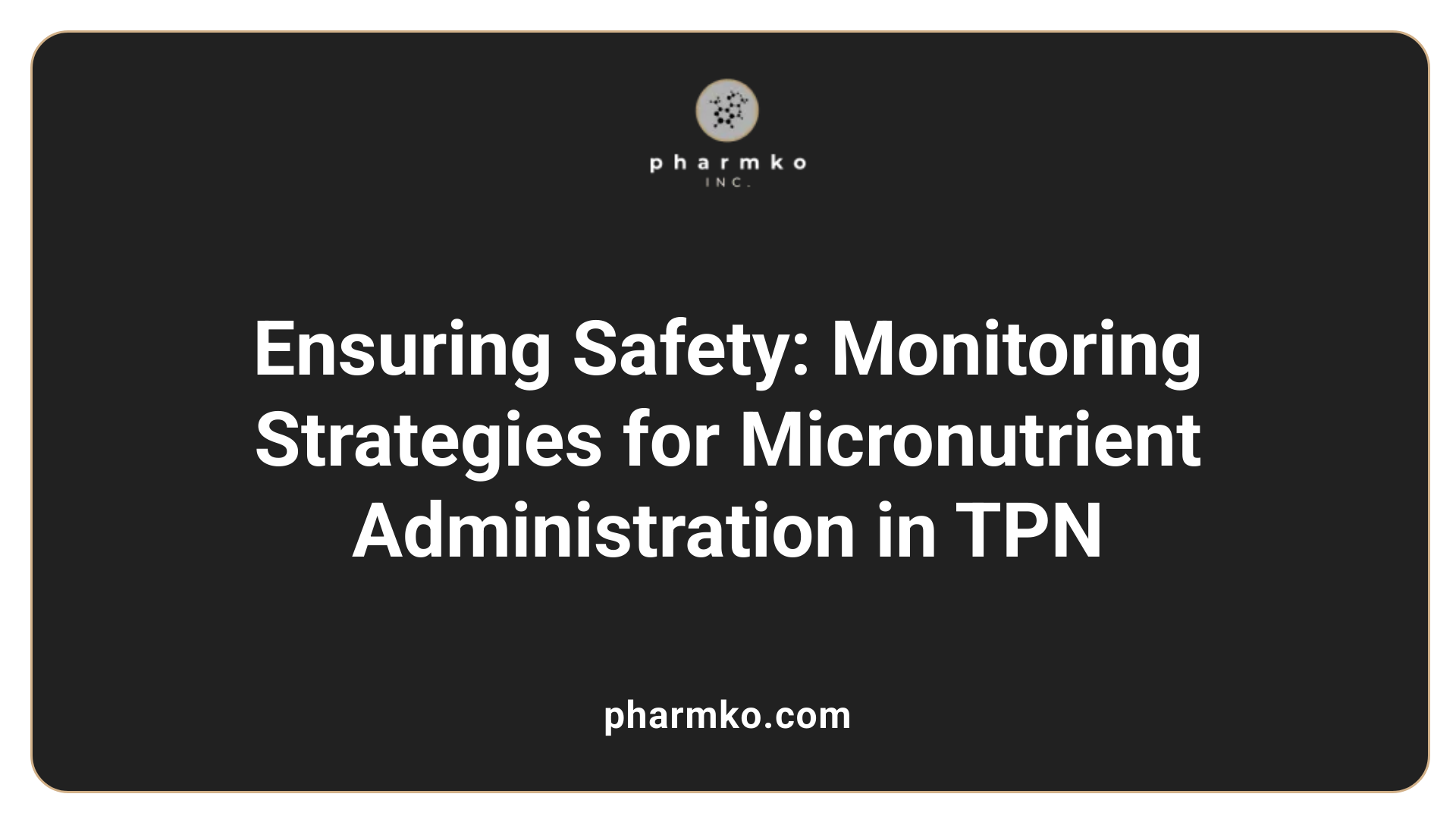
What are the key considerations for administering TPN safely?
Administering Total Parenteral Nutrition (TPN) requires meticulous attention to safety to prevent complications and ensure proper nutrient delivery. One of the fundamental aspects is adhering to strict aseptic techniques during preparation and connection. This minimizes the risk of bloodstream infections, which can be severe.
Before administration, healthcare providers must carefully inspect the TPN solution for correct composition, expiration date, and clarity. The solution should be warmed to room temperature to avoid patient discomfort and ensure proper infusion. Any added medications or supplements, such as electrolytes or vitamins, must be prepared aseptically to prevent precipitates or interactions.
Ongoing monitoring plays a vital role in safe TPN use. Regular blood tests to measure electrolytes, liver function, and glucose levels help detect metabolic abnormalities early. This includes checking serum sodium, potassium, magnesium, calcium, and phosphorus, among others.
Using infusion pumps ensures accurate delivery rates, reducing errors that could lead to over- or under-dosing. Secure handling of the central venous catheter, with routine flushing using sterile saline or heparin, maintains line patency and minimizes infection risks.
Patient assessment should include watching for signs of infection, metabolic disturbances, or catheter-related issues like thrombosis or occlusion. Prompt intervention is essential if any adverse signs develop. Healthcare teams—including clinicians, dietitians, and pharmacists—must work together to review laboratory results, adjust dosages as needed, and ensure the formulation remains stable and compatible throughout treatment.
In summary, safe TPN administration hinges on meticulous preparation, diligent monitoring, and prompt responses to potential complications, safeguarding patient health and optimizing nutritional support.
Regulatory Oversight and Guidelines
Total parenteral nutrition (TPN) solutions are complex formulations that require strict regulation and adherence to safety standards to ensure patient well-being. Regulatory agencies such as the U.S. Food and Drug Administration (FDA) and professional organizations like the American Society for Parenteral and Enteral Nutrition (ASPEN) play crucial roles in setting these standards.
The FDA oversees the approval and manufacturing of TPN components, ensuring that all ingredients are safe, effective, and of consistent quality. This includes regulating the pharmacy-compounded solutions and commercially prepared products. ASPEN provides clinical guidelines that help healthcare teams formulate, administer, and monitor TPN therapy effectively.
Formulation guidelines emphasize the importance of tailoring nutrient compositions to individual patient needs. This personalized approach involves using specific micronutrient ratios, electrolyte balances, and caloric levels based on ongoing laboratory evaluations, such as serum electrolyte and liver function tests.
Ensuring sterility and compatibility during preparation and storage is of paramount importance. TPN solutions must be prepared under sterile conditions to prevent bacterial contamination. Compatibility considerations include avoiding interactions that might cause precipitation or destabilization of components, which could lead to embolism or organ damage.
Regulations also specify the physical and chemical stability of TPN mixtures during preparation, transportation, and delivery. This includes guidelines on the shelf life, refrigeration, and proper handling procedures.
Monitoring and safety are reinforced through routine blood tests—checking electrolyte levels, kidney and liver functions, and serum proteins—to promptly detect and correct metabolic disturbances. Civil and health authorities continuously review and update these standards based on new research and clinical outcomes.
In summary, strict regulatory oversight by agencies like the FDA and professional guidelines from organizations such as ASPEN ensure that TPN is safe, effective, and tailored to individual patient requirements, promoting optimal nutritional support while minimizing risks.
Clinical Outcomes and Advantages of Proper Micronutrient Inclusion
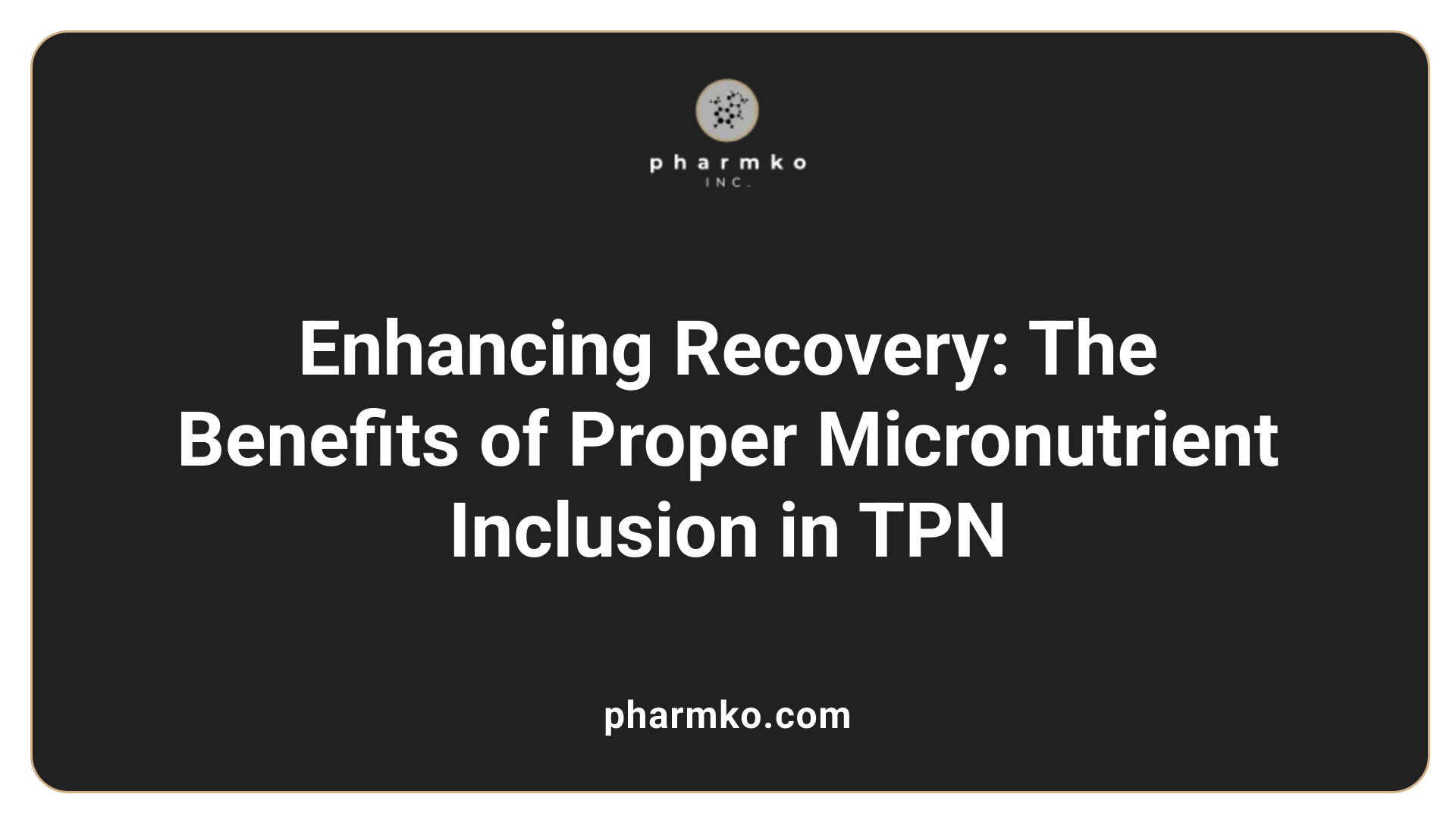
How does TPN compare to other feeding methods in terms of nutritional support?
Total parenteral nutrition (TPN) supplies complete nutritional support by delivering essential nutrients directly into the bloodstream, effectively bypassing the gastrointestinal tract. It is typically employed when the digestive system cannot function properly, such as in cases of bowel obstruction, severe gastrointestinal diseases, or during post-major surgery recovery.
In contrast, enteral nutrition (tube feeding) is preferred when the gut remains functional, as it is less invasive and associated with fewer complications. While TPN allows for precise control of nutrient delivery, facilitating tailored nutrition for critically ill or malnourished patients, it also presents higher risks, including bloodstream infections, liver issues, and increased costs.
Studies suggest that enteral feeding supports gut integrity, reduces infection risk, and is generally safer and more cost-effective. However, in situations where enteral nutrition isn't feasible—due to malabsorption or gastrointestinal failure—TPN becomes an indispensable alternative.
Therefore, although TPN is vital when enteral nutrition cannot meet nutritional needs, it is more invasive with a higher complication profile. The choice depends on the patient’s condition, with TPN reserved for cases where enteral routes are inadequate or impossible.
Conclusion: Optimizing Micronutrient Use in TPN
Total parenteral nutrition (TPN) is a vital method for delivering complete nutrition directly into the bloodstream when the gastrointestinal tract cannot be used effectively. It forms a complex mixture of macronutrients like lipids, dextrose, and amino acids, along with micronutrients such as vitamins and minerals, tailored to meet individual patient needs.
Best practices for micronutrient management in TPN emphasize personalized formulations based on regular monitoring. Healthcare teams perform weekly blood tests to check electrolyte levels, serum proteins, liver, and kidney function. This helps identify deficiencies or excesses in vitamins, minerals, and electrolytes.
Monitoring parameters include serum electrolytes (sodium, potassium, calcium, magnesium, phosphorus), blood glucose, and liver function tests. Adjustments are made accordingly to maintain optimal levels, prevent metabolic abnormalities, and avoid complications like hyperglycemia, electrolyte disturbances, or cholestasis.
Creating patient-specific formulations involves collaboration among clinicians, dietitians, and pharmacists. These formulations are customized based on lab results, clinical condition, and specific needs, considering factors like surgical recovery or underlying disease states.
Compared to other feeding methods, TPN offers complete nutritional support by bypassing the digestive system, which is crucial when enteral feeding is impossible. However, while TPN provides precise control and can fulfill all nutritional requirements, it carries risks such as bloodstream infections, liver problems, and higher costs. Enteral nutrition typically presents fewer risks and is preferred when the gut is functional.
In summary, optimizing micronutrient use in TPN involves careful selection, regular monitoring, and tailored formulations. This approach ensures safe, effective nutritional support, helping patients recover faster, maintain health, and reduce complications associated with parenteral feeding.
Final Thoughts on Micronutrient Integration in TPN
Integrating micronutrients such as vitamins, minerals, trace elements, and electrolytes into TPN formulations is crucial for ensuring patients receive comprehensive nutrition that supports recovery, immune competence, and overall health. The composition of these micro-nutrients must be carefully individualized, monitored, and adjusted to prevent deficiencies and toxicities. Adherence to established guidelines and safety protocols enables healthcare providers to maximize the benefits of TPN while minimizing risks such as metabolic disturbances and infections. As advancements in clinical nutrition continue, ongoing research and strict compliance with monitoring standards will further optimize TPN outcomes, ensuring patients receive the full therapeutic benefit of this life-saving intervention.
References
- What is in a TPN Solution?
- Total Parenteral Nutrition - StatPearls
- Total Parenteral Nutrition: Home Care Guide
- TOTAL PARENTERAL NUTRITION - PMC
- Understanding Total Parenteral Nutrition for Optimal Health
- Parenteral Nutrition: What it Is, Uses & Types
- Total Parenteral Nutrition - StatPearls
- Perspectives on parenteral micronutrient shortages
- Micronutrients in Parenteral Nutrition: Too Little or ...













